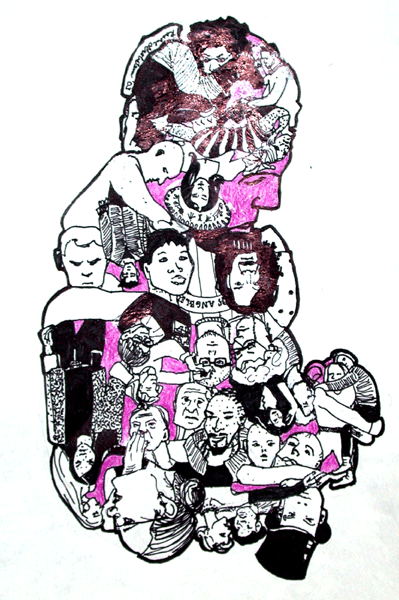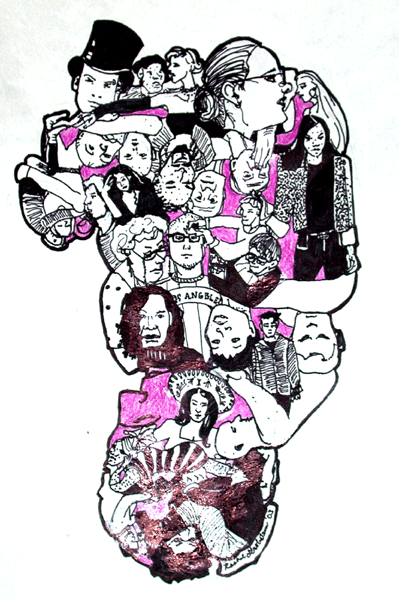Made available on Serendip
In association with Making Sense of Diversity: An Exploration, a world wide conversation

|
What's In a Name?: Re-defining Feminism at Bryn Mawr in 2005
Participants
Summary
Prepared by Anne Dalke
Additions, revisions, extensions are encouraged in the On-Line Forum
| 
|
Does feminism in 2005 require laying down that word--because it keeps some folks out of the conversation, out of engaging w/ the issues (indeed, even seeing the work as being about their issues, rather than about well-to-do white women getting a piece of the action)? Does the word "feminism" prevent some folks from coming to the table and having an open conversation (and so hamper feminism from doing what all intellectual work needs to do continually: interrogate its own presumptions)?
Or does the proposed re-naming of the Feminist and Gender Studies Program to Gender and Sexuality signal a move away from activism, from engagement in the practical work against women's oppression in which academic work in gender began, and where it continues to be focused? At a woman's college, do we want to claim the word, and the actions, of feminism?
We began our discussion of these issues by describing what feminism looks like to us today, why we use the word, how we enact it on campus--
or refuse to, or question its usefulness...
Feminism at Bryn Mawr today includes
- spiritual feminists
- eco-feminists
- sex-positive feminists (who believe that "everyone should have the kind of consensual sex they want," that sex workers, for instance, should not be judged, but supported--an activity which includes considerable attention to matters of race and class)
- reluctant feminists who "don't want to go to what doesn't seem like a good place" (if you know you want to do something, it doesn't matter what it's called; if you don't know, the word can matter a lot)
- an awareness that ours is a bi-co program that must accomodate Haverford's needs as well as BMC's
- a desire not to scare off potential students.
Feminism is important here:
- it is a word of privilege that embodies all the struggles before and including our own
- it involves a commitment to what will be taught at Bryn Mawr (feminist anaysis leads us to see that gender is unimportant, and should continue to be taught, without catering to--or making comfortable--the people who don't understand)
- although the history of feminism has been exclusionary, the movement has become increasingly inclusive over time, incorporating (for instance) the concerns of men and sexual minorities
- feminism intersects insistently with issues of race, class and sexual orientation; men need feminism to keep themselves alive, and should be assisted in work to "end their own privilege"
- the terms "gender and sexuality" reflect the current interests of scholars in the field--as well as those of most people in the world.
Feminist theory is being taught here. But is it "not feminist to have feminism in the title" of the program? Is setting the word aside a healthy action for the feminist movement, one that would enlarge its scope? Or does removing the name undermine what the program is trying to do? We want those who have felt alienated from feminism to be part of the discussion, but attempts at accomodation and compromise might mean that the movement loses its commitment to ending the oppression of women. Will changing the program's name to "Gender and Sexuality" signal that Bryn Mawr is "not going to be feminist any more"? Will the removal of feminism from the title lead to the interpretation that Bryn Mawr is saying feminism is not significant here? Or will removing feminism make the program and the work it fosters more inclusive, more accessible, more open to exploring various points of view?
There has been a conflation of identity activism with academic discipline throughout this discussion; feminism is a methodological approach, as well as "deeply off-putting" to some black women. Some women could not relate to this conversation, didn't understand the stereotypes or know "what it means to look like a feminist." It's very important to reclaim exclusionary terms to make them inclusive (think "queer," think "black"); it's empowering to use ourselves the words that have been used against us. Would "Feminism, Gender and Sexuality" be a more appropriate name? Or does increasing the numbers of categories listed in the title increase awareness of all the categories not included there? Using "Gender and Sexuality" makes the program seem more inviting to psychologists and biologists (who may however feel no obligation to teach or enact feminist theory). How much is the program invested in policing a certain line or kind of thinking?
The discussion adjourned in order to continue at a meeting with Cherrie Moraga. It is invited to continue further in the on-line forum on "Making Sense of Diversity," and will resume in person at noon on Friday, Mar. 18, when Yinnette Sano (05) and Chris MacDonald-Dennis (Office of Intercultural Affairs) will lead a discussion about "One People, Many Stories: Latina Identities."
| Return to Schedule for Friday Noon Conversations

| Bryn Mawr Conversations
| Archived
Forum
| Archive of Bryn Mawr Conversation
| General Conversation
| Serendip Home |
These pages are sponsored by the Bryn Mawr College Office
of Intercultural Affairs, the Center for Science and Society and the Serendip
website. Send us additional comments or suggestions at Serendip
© by Serendip 1994-
- Last Modified:
Wednesday, 21-June-2005 15:18:00 EST

